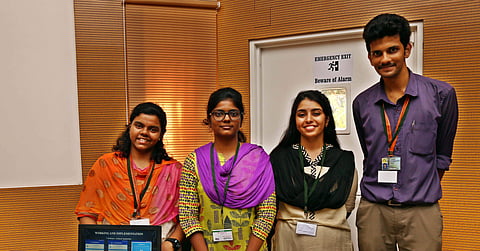

Gone are the days when farmers need to rely on their senses or the local godmen to predict the weather. A four-member team from Loyola-ICAM College of Engineering and Technology (LICET) has developed a prototype of an irrigation controller system that can be installed in the fields to automatically irrigate in accordance with the local weather. Their project even bagged the third place at innoWAH!, a pan-IIT Alumni Leadership Series (PALS) innovation challenge competition. The members of the team, Febin Thomas M, Visalachi S, Prema C and Kiran Lalwani N belong to the Department of Information Technology.
"The Irrigation Controller System is meant to conserve water. It reduces water consumption by 50 % using drip and sprinkler irrigation techniques, and of course, the type of crop must be considered while choosing the method of irrigation," explains 20-year-old Febin Thomas, who says that the idea struck him after he read about auto-irrigation theories on the internet almost a year ago.
PALS is an initiative by the IIT Alumni Industry Interaction Center that is aimed at benefitting students and faculty of engineering colleges in and around Chennai. This year's event saw various innovative projects like an artificially-constructed wetland to a smart fuel tank. "We started this six years ago as a lecture series for Tier II and Tier III engineering colleges, but we eventually went on to organise events like innoWAH!. Our objective is to push students to think beyond competitions. That is why we urge them to consider the application of these ideas in the industry before submitting their projects. Conservation of natural resources has been the theme of the challenge for the past few years now and major importance is given to the practicality of the project," says R Krishnamurti Rao, who is a core team member of PALS.
The Irrigation Controller System is also linked to an Android app that functions as an additional controller to help the farmer an the field even from a remote location. "The app will not just show the weather forecast, but it will also display values like atmospheric temperature, soil moisture levels, and whether the field has been irrigated for the day. It has also been fitted with a manual switch if the farmer needs to turn the system off. All they need is a wireless network to operate it," explains Febin, who has been pivotal in the project.
And what is the technology behind the system? "We used an Open Weather Map API which collects the weather forecast for that particular day. The panel members who judged the event gave us positive feedback on how feasible it would be in reality," explains Prema, a team member. But with most of the farmers lacking a proper base in education, will they be able to learn how to use this app? The team assures that their app is user-friendly and doesn't require strong technical knowledge to operate it. "We will, of course, train them to use the system until they get the hang of it," assures Visalachi, another team member. The team has been grateful to their mentor R Sasikumar, Assistant Professor (Information Technology) at LICET, who offered support and gave them valid inputs whenever they hit a dead end.
